社会语言学
社会语言学和语言社会学 英文解释

社会语言学和语言社会学英文解释
社会语言学(Sociolinguistics)是研究语言在社会中如何使用、变化和发
展的学科。
它关注语言与社会的相互关系,包括语言的变化、语言的多样性、语言的社会功能、语言与身份的关系等等。
社会语言学试图理解语言在社会生活中的作用,以及社会因素如何影响语言的使用和变化。
语言社会学(Sociology of Language)是研究语言在社会结构和社会变迁中的地位和作用的学科。
它关注语言的形成、变化和发展,以及语言如何影响社会的形成和发展。
语言社会学也研究语言在社会中的功能,以及语言如何反映和塑造社会结构和文化。
简而言之,社会语言学更关注语言在社会生活中的具体应用和变化,而语言社会学更关注语言在社会结构和文化中的作用和地位。
这两个学科有很多交叉点,但研究重点和方法有所不同。
社会语言学的基本概念

社会语言学为语言教育课程设置和教 材编写提供理论指导,确保教学内容 的实用性和针对性。
教师培训与教学评估
社会语言学有助于教师培训和教学评 估,提高教师的教学水平和评估能力 。
06
社会语言学的未来展望
语言与人工智能的结合
自然语言处理
利用人工智能技术,实现机器对人类语言的自动识别、理解和生 成,提高人机交互的效率和准确性。
语言规划实施
社会语言学关注语言规划的实施过程, 分析实施效果,提出改进建议,促进 语言规划的可持续发展。
跨文化交际
文化差异识别
社会语言学帮助人们识别不同文化间的语言 差异,促进跨文化交流的顺利进行。
交际能力培养
社会语言学强调培养交际能力,包括语言使 用得体、文化适应等,提高跨文化交际的效 果。
语言教育
语言与身份认同研究
关注个体和群体如何通过语言 表达和建构身份认同。
语言与文化研究
研究语言与文化之间的相互关 系,包括文化传承、文化交流 和文化冲突等方面。
语言政策与规划研究
关注政府和机构如何制定和实 施语言政策,以及这些政策对
社会的影响。
03
社会语言学的主要研究内 容
社会语境中的语言使用
语言使用与社会环境
社会语言学的起源与当时的社会文化背景密切 相关,随着社会的发展和人口迁移的增加,语 言接触和变异现象引起了学者们的关注。
社会语言学的起源也与语言学、社会学、人类 学等学科的交叉研究有关,这些学科的理论和 方法为社会语言学的发展提供了基础。
发展历程
20世纪60年代
社会语言学兴起,研究重点在于语言变异和 语言接触。
语言变化研究
社会语言学关注语言随时间和社会变迁而产生的变化,包括语音、词 汇、语法等方面的变化,探究这些变化的动因和规律。
社会语言学名词解释

社会语言学名词解释
社会语言学是一门研究人类语言和社会文化之间的相互作用和
关系的学科,主要关注语言使用的场合、语言使用的人群、语言使用的条件等因素,旨在揭示语言和社会文化之间的本质联系。
社会语言学的研究对象包括语言、文化、社会、认知等多个方面。
社会语言学的主要研究方法包括定量和定性研究。
定量研究主要是通过调查问卷、定量分析语言数据等方式,研究语言使用的人群特征和社会文化背景。
定性研究则是通过访谈、观察等方式,研究语言使用的场景和条件,以及语言使用对个人和社会的影响。
社会语言学的重要领域包括跨文化交流、语言交际、社会心理学、认知科学等。
在跨文化交流方面,社会语言学研究不同文化之间的语言差异,探讨语言差异对交际关系的影响,提倡跨文化交流和理解。
在语言交际方面,社会语言学研究语言使用的场景和条件,探讨语言使
用对交际效果的影响,提出有效的语言交际策略。
在社会心理学方面,社会语言学研究语言使用和心理过程的关系,探讨语言使用的心理因素,研究人类认知的特点和语言使用的关系。
在认知科学方面,社会语言学研究语言和思维之间的联系,探讨语言使用的认知能力,提出认
知语言学的概念和研究方法。
社会语言学的定义

社会语言学的定义
社会语言学的定义:
社会语言学是一门从人类社会生活的角度观察语言的运用,或从语言的角度探索人类社会生活的语言学分支学科。
社会语言学属于广义的应用语言学。
社会语言学是在20世纪60年代在美国首先兴起的一门边缘科学。
它主要是指运用语言学和社会学等学科的理论和方法,从不同的社会科学的角度去研究语言的社会本质和差异的一门学科。
社会语言学有两个主要的检索领域:第一是社会生活的变化将引起语言(诸因素)的变化,其中包括社会语境的变化对语言要素的影响;第二是从语言(诸因素)的变化探究社会(诸因素)的变化。
第八章 社会语言学
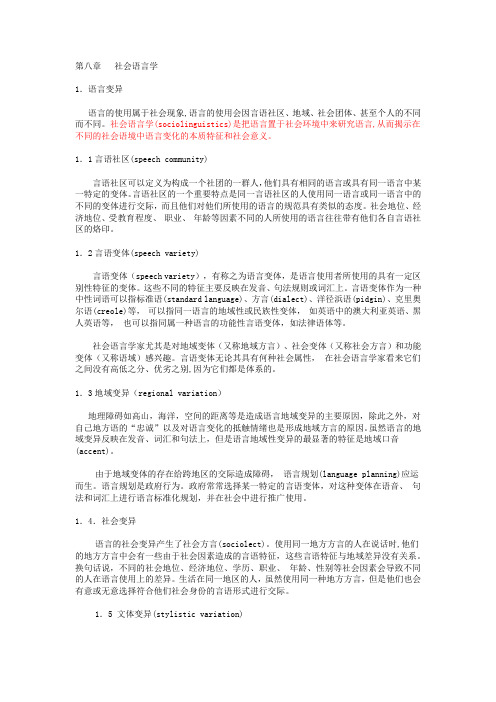
第八章社会语言学1.语言变异语言的使用属于社会现象,语言的使用会因言语社区、地域、社会团体、甚至个人的不同而不同。
社会语言学(sociolinguistics)是把语言置于社会环境中来研究语言,从而揭示在不同的社会语境中语言变化的本质特征和社会意义。
1.1言语社区(speech community)言语社区可以定义为构成一个社团的一群人,他们具有相同的语言或具有同一语言中某一特定的变体。
言语社区的一个重要特点是同一言语社区的人使用同一语言或同一语言中的不同的变体进行交际,而且他们对他们所使用的语言的规范具有类似的态度。
社会地位、经济地位、受教育程度、职业、年龄等因素不同的人所使用的语言往往带有他们各自言语社区的烙印。
1.2言语变体(speech variety)言语变体(speech variety),有称之为语言变体,是语言使用者所使用的具有一定区别性特征的变体。
这些不同的特征主要反映在发音、句法规则或词汇上。
言语变体作为一种中性词语可以指标准语(standard language)、方言(dialect)、洋径浜语(pidgin)、克里奥尔语(creole)等,可以指同一语言的地域性或民族性变体,如英语中的澳大利亚英语、黑人英语等,也可以指同属一种语言的功能性言语变体,如法律语体等。
社会语言学家尤其是对地域变体(又称地域方言)、社会变体(又称社会方言)和功能变体(又称语域)感兴趣。
言语变体无论其具有何种社会属性,在社会语言学家看来它们之间没有高低之分、优劣之别,因为它们都是体系的。
1.3地域变异(regional variation)地理障碍如高山,海洋,空间的距离等是造成语言地域变异的主要原因,除此之外,对自己地方语的“忠诚”以及对语言变化的抵触情绪也是形成地域方言的原因。
虽然语言的地域变异反映在发音、词汇和句法上,但是语言地域性变异的最显著的特征是地域口音(accent)。
由于地域变体的存在给跨地区的交际造成障碍,语言规划(language planning)应运而生。
社会语言学概论知识点总结

社会语言学概论知识点总结社会语言学是语言学的一个重要分支领域,它研究语言在社会和文化环境中的运用和演变。
通过社会语言学的研究,我们可以了解语言与社会之间的相互关系,深化对语言的理解,促进语言教育和跨文化交流。
下面,我们将对社会语言学的一些重要知识点进行总结和分析。
一、语言和社会1. 语言的社会功能语言不仅是人类交流的工具,更是社会交往的重要媒介。
社会语言学研究语言在社会中的作用和功能,包括信息传递、社交互动、文化传承等方面。
通过研究语言的社会功能,可以更好地理解语言的本质和价值,对语言运用和教育有深远影响。
2. 语言和身份认同语言是个体和群体身份认同的重要标志。
社会语言学研究了语言与社会身份、地域、文化等因素的关系,揭示了语言对身份认同的影响和作用。
不同的社会群体使用不同的语言和变体,反映了他们的特定社会身份和归属感。
3. 语言政治与权力语言是权力和政治的工具,在不同社会和文化中存在着语言的政治化现象。
社会语言学研究了语言政治对语言使用和语言变体的影响,以及不同语言在权力和政治领域中的地位和作用。
研究语言政治有助于深化对权力和文化关系的认识,促进语言权利的保护与促进。
二、语言变体与语言变化1. 语言变体社会语言学研究了语言的地域变体、社会变体、个人变体等不同层面上的语言变体现象。
地域变体指不同地区的语言差异,社会变体指不同社会群体的语言使用差异,个人变体指个体语言使用的差异。
了解语言变体可以帮助我们理解语言的多样性和动态性,促进跨文化交流和交际。
2. 语言变化语言是不断变化的,社会语言学研究了语言变化的原因和规律。
语言变化可以是由外部因素(如社会变迁、接触语言等)或内部因素(如语音、词汇、语法等方面的演变)所导致。
了解语言变化有助于我们把握语言发展的趋势和规律,促进语言教育和翻译工作。
三、语言接触与语言习得1. 语言接触语言接触指不同语言和语言变体之间的交际和交流。
社会语言学研究了语言接触的影响和结果,包括语言借词、语言转换、典型联系等现象。
《社会语言学》课件
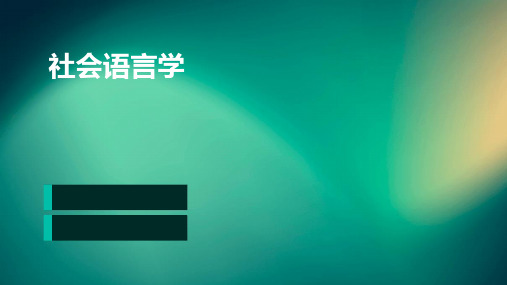
实证研究是社会语言学研究的重要方法之一。未 来,社会语言学将更加注重实证研究,通过实地 调查、实验等方法来验证理论假设和探究语言现 象的本质。
THANKS FOR WATCHING
感谢您的观看
语言中的文化信息
探讨语言中蕴含的文化信息,如价值观、信仰、 习俗和传统等。
跨文化交际
研究不同文化背景的人们在交际过程中如何理解 和使用语言。
语言与性别
性别与语言使用
01
研究不同性别在语言使用上的差异,包括词汇、语调和话题选
择等。
性别与语言权利
02
探讨性别如何影响语言权利的变化
03
研究语言变化过程中性别的角色和影响,以及性别如何影响语
言的演变。
语言与年龄
年龄与语言使用
研究不同年龄段在语言使用上的差异,包括词汇、语法和语用等 。
代际差异与语言传承
探讨不同代际之间在语言使用上的差异,以及这些差异如何影响 语言的传承和发展。
年龄与语言变化
研究年龄因素在语言变化中的作用,以及年龄如何影响语言的演 变和发展。
03 社会语言学理论
语言与社会结构
01
语言与社会结构相互影响
语言不仅是社会结构的反映,同时也参与构建社会结构。社会结构中的
各种因素,如阶级、性别、年龄等,都在一定程度上影响语言的使用。
02 03
社会方言与地域方言
不同的社会群体和地域会有不同的语言变体,这些变体被称为社会方言 和地域方言。社会方言主要反映社会群体的差异,地域方言则反映地理 区域的差异。
社会语言学
目录
• 社会语言学概述 • 社会语言学研究的主要内容 • 社会语言学理论 • 社会语言学应用 • 社会语言学的挑战与未来发展
社会语言学
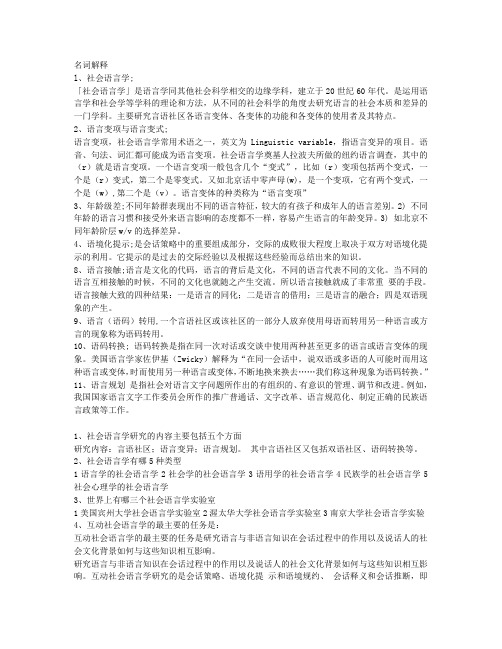
名词解释l、社会语言学;「社会语言学」是语言学同其他社会科学相交的边缘学科,建立于20世纪60年代。
是运用语言学和社会学等学科的理论和方法,从不同的社会科学的角度去研究语言的社会本质和差异的一门学科。
主要研究言语社区各语言变体、各变体的功能和各变体的使用者及其特点。
2、语言变项与语言变式;语言变项,社会语言学常用术语之一,英文为Linguistic variable,指语言变异的项目。
语音、句法、词汇都可能成为语言变项。
社会语言学奠基人拉波夫所做的纽约语言调查,其中的(r)就是语言变项。
一个语言变项一般包含几个“变式”,比如(r)变项包括两个变式,一个是(r)变式,第二个是零变式。
又如北京话中零声母(w),是一个变项,它有两个变式,一个是(w),第二个是(v)。
语言变体的种类称为“语言变项”3、年龄级差;不同年龄群表现出不同的语言特征,较大的有孩子和成年人的语言差别。
2) 不同年龄的语言习惯和接受外来语言影响的态度都不一样,容易产生语言的年龄变异。
3) 如北京不同年龄阶层w/v的选择差异。
4、语境化提示;是会话策略中的重要组成部分,交际的成败很大程度上取决于双方对语境化提示的利用。
它提示的是过去的交际经验以及根据这些经验而总结出来的知识。
8、语言接触;语言是文化的代码,语言的背后是文化,不同的语言代表不同的文化。
当不同的语言互相接触的时候,不同的文化也就随之产生交流。
所以语言接触就成了非常重要的手段。
语言接触大致的四种结果:一是语言的同化;二是语言的借用;三是语言的融合;四是双语现象的产生。
9、语言(语码)转用,一个言语社区或该社区的一部分人放弃使用母语而转用另一种语言或方言的现象称为语码转用。
10、语码转换; 语码转换是指在同一次对话或交谈中使用两种甚至更多的语言或语言变体的现象。
美国语言学家佐伊基(Zwicky)解释为“在同一会话中,说双语或多语的人可能时而用这种语言或变体,时而使用另一种语言或变体,不断地换来换去……我们称这种现象为语码转换。
社会语言学_高等教育-语言学
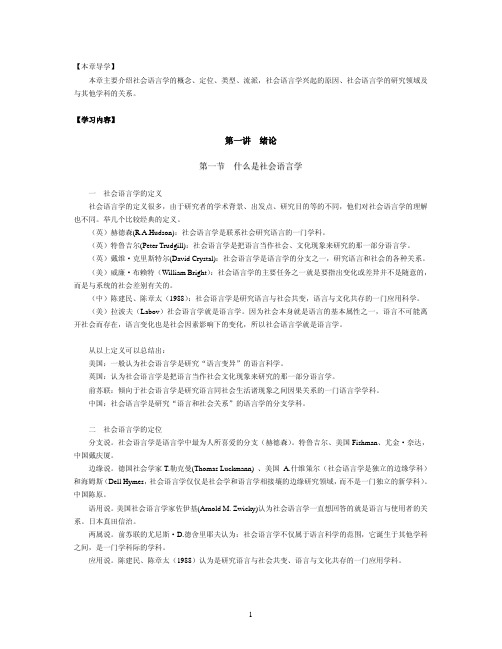
【本章导学】本章主要介绍社会语言学的概念、定位、类型、流派,社会语言学兴起的原因、社会语言学的研究领域及与其他学科的关系。
【学习内容】第一讲绪论第一节什么是社会语言学一社会语言学的定义社会语言学的定义很多,由于研究者的学术背景、出发点、研究目的等的不同,他们对社会语言学的理解也不同。
举几个比较经典的定义。
(英)赫德森(R.A.Hudson):社会语言学是联系社会研究语言的一门学科。
(英)特鲁吉尔(Peter Trudgill):社会语言学是把语言当作社会、文化现象来研究的那一部分语言学。
(英)戴维·克里斯特尔(David Crystal):社会语言学是语言学的分支之一,研究语言和社会的各种关系。
(美)威廉·布赖特(William Bright):社会语言学的主要任务之一就是要指出变化或差异并不是随意的,而是与系统的社会差别有关的。
(中)陈建民、陈章太(1988):社会语言学是研究语言与社会共变,语言与文化共存的一门应用科学。
(美)拉波夫(Labov)社会语言学就是语言学。
因为社会本身就是语言的基本属性之一,语言不可能离开社会而存在,语言变化也是社会因素影响下的变化,所以社会语言学就是语言学。
从以上定义可以总结出:美国:一般认为社会语言学是研究“语言变异”的语言科学。
英国:认为社会语言学是把语言当作社会文化现象来研究的那一部分语言学。
前苏联:倾向于社会语言学是研究语言同社会生活诸现象之间因果关系的一门语言学学科。
中国:社会语言学是研究“语言和社会关系”的语言学的分支学科。
二社会语言学的定位分支说。
社会语言学是语言学中最为人所喜爱的分支(赫德森)。
特鲁吉尔、美国Fishman、尤金·奈达,中国戴庆厦。
边缘说。
德国社会学家T.勒克曼(Thomas Luckmann) 、美国 A.什维策尔(社会语言学是独立的边缘学科)和海姆斯(Dell Hymes,社会语言学仅仅是社会学和语言学相接壤的边缘研究领域,而不是一门独立的新学科)。
社会语言学
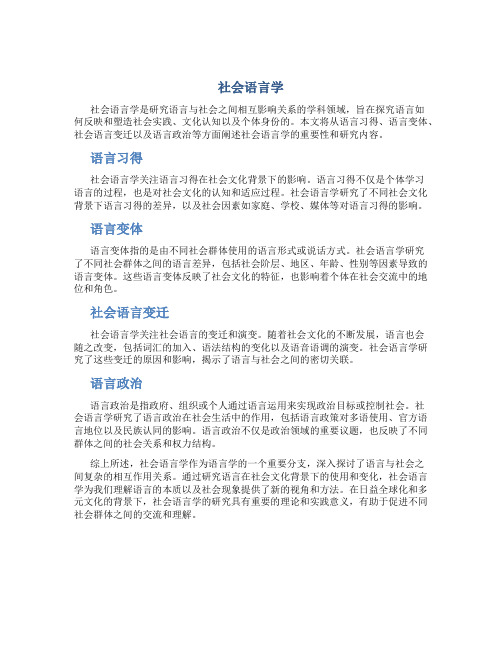
社会语言学社会语言学是研究语言与社会之间相互影响关系的学科领域,旨在探究语言如何反映和塑造社会实践、文化认知以及个体身份的。
本文将从语言习得、语言变体、社会语言变迁以及语言政治等方面阐述社会语言学的重要性和研究内容。
语言习得社会语言学关注语言习得在社会文化背景下的影响。
语言习得不仅是个体学习语言的过程,也是对社会文化的认知和适应过程。
社会语言学研究了不同社会文化背景下语言习得的差异,以及社会因素如家庭、学校、媒体等对语言习得的影响。
语言变体语言变体指的是由不同社会群体使用的语言形式或说话方式。
社会语言学研究了不同社会群体之间的语言差异,包括社会阶层、地区、年龄、性别等因素导致的语言变体。
这些语言变体反映了社会文化的特征,也影响着个体在社会交流中的地位和角色。
社会语言变迁社会语言学关注社会语言的变迁和演变。
随着社会文化的不断发展,语言也会随之改变,包括词汇的加入、语法结构的变化以及语音语调的演变。
社会语言学研究了这些变迁的原因和影响,揭示了语言与社会之间的密切关联。
语言政治语言政治是指政府、组织或个人通过语言运用来实现政治目标或控制社会。
社会语言学研究了语言政治在社会生活中的作用,包括语言政策对多语使用、官方语言地位以及民族认同的影响。
语言政治不仅是政治领域的重要议题,也反映了不同群体之间的社会关系和权力结构。
综上所述,社会语言学作为语言学的一个重要分支,深入探讨了语言与社会之间复杂的相互作用关系。
通过研究语言在社会文化背景下的使用和变化,社会语言学为我们理解语言的本质以及社会现象提供了新的视角和方法。
在日益全球化和多元文化的背景下,社会语言学的研究具有重要的理论和实践意义,有助于促进不同社会群体之间的交流和理解。
语言学流派
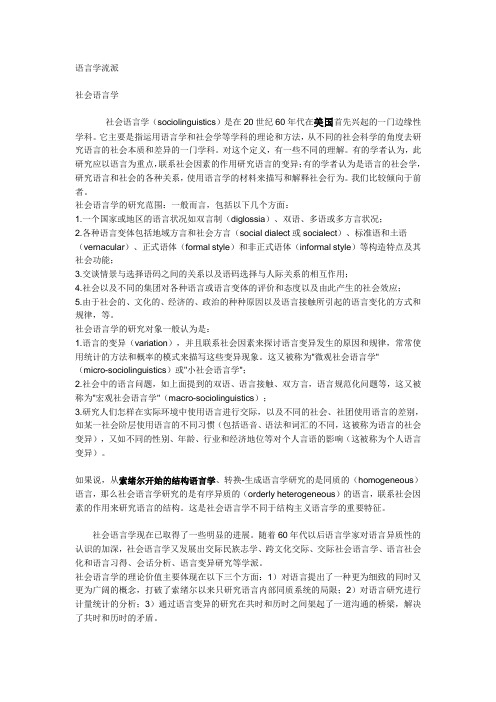
语言学流派社会语言学社会语言学(sociolinguistics)是在20世纪60年代在美国首先兴起的一门边缘性学科。
它主要是指运用语言学和社会学等学科的理论和方法,从不同的社会科学的角度去研究语言的社会本质和差异的一门学科。
对这个定义,有一些不同的理解。
有的学者认为,此研究应以语言为重点,联系社会因素的作用研究语言的变异;有的学者认为是语言的社会学,研究语言和社会的各种关系,使用语言学的材料来描写和解释社会行为。
我们比较倾向于前者。
社会语言学的研究范围:一般而言,包括以下几个方面:1.一个国家或地区的语言状况如双言制(diglossia)、双语、多语或多方言状况;2.各种语言变体包括地域方言和社会方言(social dialect或socialect)、标准语和土语(vernacular)、正式语体(formal style)和非正式语体(informal style)等构造特点及其社会功能;3.交谈情景与选择语码之间的关系以及语码选择与人际关系的相互作用;4.社会以及不同的集团对各种语言或语言变体的评价和态度以及由此产生的社会效应;5.由于社会的、文化的、经济的、政治的种种原因以及语言接触所引起的语言变化的方式和规律,等。
社会语言学的研究对象一般认为是:1.语言的变异(variation),并且联系社会因素来探讨语言变异发生的原因和规律,常常使用统计的方法和概率的模式来描写这些变异现象。
这又被称为"微观社会语言学"(micro-sociolinguistics)或"小社会语言学";2.社会中的语言问题,如上面提到的双语、语言接触、双方言,语言规范化问题等,这又被称为"宏观社会语言学"(macro-sociolinguistics);3.研究人们怎样在实际环境中使用语言进行交际,以及不同的社会、社团使用语言的差别,如某一社会阶层使用语言的不同习惯(包括语音、语法和词汇的不同,这被称为语言的社会变异),又如不同的性别、年龄、行业和经济地位等对个人言语的影响(这被称为个人语言变异)。
什么是社会语言学
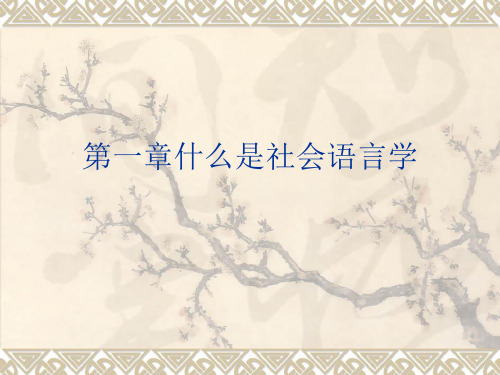
.一个国家或地区的语言状况。如双言制、双语、多 语或多方言状况。按种族、民族、阶级、阶层、性 别、年龄、职业、文化程度等属性划分的各类言语 共同体使用语言的状况和特征。 .各种语言变体。地域方言和社会方言、标准语和土 话、正式语体和费正式语体等构造特点及其社会功 能。 .交谈的情景(包括对话人的角色关系、话题、场合、 说话人的动机等)与选择语码之间的关系以及语码 选择与人际关系的相互作用。 .社会以及不同的社会集团对各种语言或语言变体的 评价和态度以及由此而产生的社会效应。 .由于社会的、文化的、经济的、政治的种种原因以 及语言接触所引起的语言变化的方式和规律。
兴起历史40年。
兴起表现:学术机构,专著和文集,专题课
程、研究队伍。
二、社会语言学兴起的三大前提
1.社会基础
语言是民族构成的一个重要方面。 任何国家或民族,为了维护其独立和统一, 都需要有与之相适应的语言政策,以利于巩 固政权、繁荣经济和加强民族归属感。 2.物质条件,主要是科学的研究方法和现代 化的工具为社会语言学研究提供便利条件。 传统的归纳对比于抽样调查和统计学上的方 法,口问、耳计、手记和录音机。
3.学术背景。索绪尔的语言学理论,乔姆斯
基的转换生成语法,萨丕尔的文化语言学, 简奥斯丁的言语行为理论。
三、社会语言学的研究范围
广义的解释是把从不同的社会科学(诸如社
会学、人类学、民族学、心理学、地理学、 历史学、哲学等)的角度去考察语言和文字。 狭义的解释则认为社会语言学主要研究语言 使用中的变异现象与社会环境之间相互关系。
如“结账”和“买单”
如果从社会来解释语 言,可以这样解释,近20年改革开放以来, 粤方言和粤语区的文化在全国取得优势地位, 所以新词有从南向北扩散的倾向,而新词最 容易为新一代所接受。如“的士,巴士,写 字楼,收银台”等。如果站在“语言社会学” 的角度,以语言来解释社会,那么可以倒过 来这样解释:“结账”一词有了香港的“买 单”这一新的变体,这反映出近20年来,香 港取代上海成为全国时尚之都的社会现象。
社会语言学

三、研究方法
●社会语言学研究方法主要分为定性研究和定量研究 两种,可广泛应用在外语教学研究中,主要分为以下 几个方面:
访谈
参与观察
收集资料
分析资料
实验法
问卷调查
四、代表人物 索绪尔
索绪尔(Saussure,18571913)首先提出社会语言学 的研究方向。他认为 Language分为两个方面,一 是语言(Langue)即平时人 们研究的语言系统或是总结 语言的使用,例如语法,句 法,词法等。另一个方面便 是言语(Parole),即社会 语言学,语言的当代的使用 偏好,与当代社会相关联的 研究方向。但并未得到当时 学者们的重视。
5)会话分析是一个专门的学派(在英文文献中常用大写的 CA来替代),主要研究两个或两个以上的人的对话,为其他 关心实际言谈的社会语言学派提供了一个非常有用的分析的 框架; 6)语言变异研究则是以拉波夫为代表的"变异学派"。1966年 美国社会语言学家拉波夫发表了《纽约城英语的社会分层》 (The social stratification of English in New York City, Washington, D.C: Center for Applied Linguistics)一文,产生了重要的影响。 他精心调查了纽约市上中等级百货公司里职员的语音,并用 一句包含fourth的句子作为调查手段。他发现,不同的r 发音, 实际上代表了不同的社会阶层:有人清楚地发r音,有人发得 不清楚甚至基本不发。经过统计,他发现,上层和中层的职 员,发r音的百分比比较高(分别为62%和51%),而下层的 职员发的比例则相对低得多(只为20%)。
对定义的争议
此研究应以语言为重 社会语言学是语言的 点,联系社会因素的 社会学,研究语言和 作用研究语言的变异。 社会的各种关系,使 用语言学材料来描写 和解释社会行为。
社会语言学
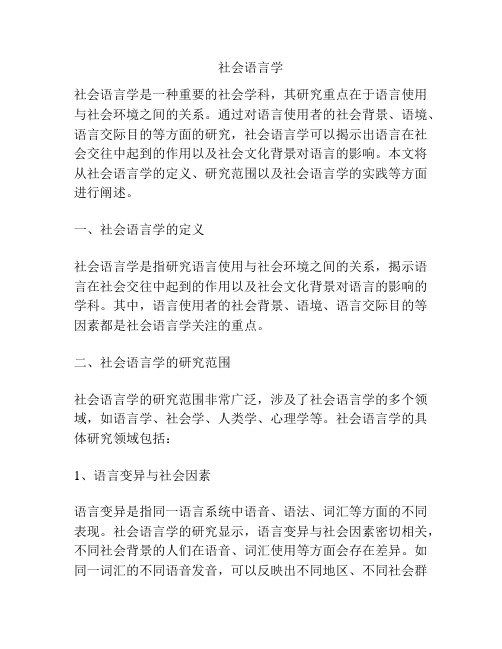
社会语言学社会语言学是一种重要的社会学科,其研究重点在于语言使用与社会环境之间的关系。
通过对语言使用者的社会背景、语境、语言交际目的等方面的研究,社会语言学可以揭示出语言在社会交往中起到的作用以及社会文化背景对语言的影响。
本文将从社会语言学的定义、研究范围以及社会语言学的实践等方面进行阐述。
一、社会语言学的定义社会语言学是指研究语言使用与社会环境之间的关系,揭示语言在社会交往中起到的作用以及社会文化背景对语言的影响的学科。
其中,语言使用者的社会背景、语境、语言交际目的等因素都是社会语言学关注的重点。
二、社会语言学的研究范围社会语言学的研究范围非常广泛,涉及了社会语言学的多个领域,如语言学、社会学、人类学、心理学等。
社会语言学的具体研究领域包括:1、语言变异与社会因素语言变异是指同一语言系统中语音、语法、词汇等方面的不同表现。
社会语言学的研究显示,语言变异与社会因素密切相关,不同社会背景的人们在语音、词汇使用等方面会存在差异。
如同一词汇的不同语音发音,可以反映出不同地区、不同社会群体之间的差异。
2、社会语言学与文化文化是一个不可或缺的元素,它决定了人们的价值观、信仰、生活方式等方面。
语言与文化密不可分,通过语言,人们传递着文化信息。
社会语言学和文化密切相关,通过对语言的潜在意义、语言交际中的歧义等方面的研究,可以深入探究语言与文化之间的关系。
3、语言与社会身份语言是人们社会身份的重要标志。
社会语言学的研究表明,人们在语音、衣着、身体语言等方面的使用,往往会受到社会身份的影响。
不同的社会身份,不同的群体,会在语言上体现出不同的特点,从而反映出其所处的社会位置。
4、语言与社会互动语言在人际交往中起着非常重要的作用。
在语言交际中,人们不仅表达信息,还通过语言来建立社会关系。
社会语言学的研究表明,语言在社会互动中具有巨大的力量,可以促进社会合作、数据交流、实现社会目标等。
三、社会语言学的实践社会语言学的研究成果可以应用于多个领域,如语言教学、语言规划、语音识别等。
社会语言学

游汝杰、邹嘉彦 指出社会语言学(Sociolinguistics)学科名称是由社会学(Sociology)和语言学(Linguistics)复合而成,内容包括两个方面,一是Social Linguistics,基本涵义是:从语言的社会属性出发,用社会学的方法研究语言,从社会的角度解释语言变体和语言演变。二是Sociology of Language,基本涵义是:从语言变体和语言演变的事实,来解释相关的社会现象及其演变和发展的过程。 从研究方向来界定社会语言学,简而言之,前者是从社会研究语言,后者是从语言研究社会。
祝畹瑾
祝畹瑾 她将研究内容细分为五个方面:(1)一个国家或地区的语言状况,和按照各种属性划分的言语共同体使用语言的状况和特征;(2)各种语言变体的构造特点及其社会功能;(3)交谈的情景与选择语码之间的关系以及语码选择与人际关系的相互作用;(4)社会以及不同的集团对各种语言变体的评价和态度以及由此产生的社会效应;(5)由于社会的、文化的、经济的政治的种种原因以及语言接触所引起的语言变化的方式和规律等。 她的界定主要是关注言语共同体、语言变体、语码转换、社会与变体的联系这几个方面。
Sociolinguistics is an umbrella term which covers a variety of different interests in language and society,including the social functions of language and the social characteristics of its users.Sociolinguistics is the studyguage varieties,the characteristics of their functions,and the characteristics of their speakers as these three constantly interact and change within a speechIseeks to discover the societal rules and norms that explain and constrain language behaviour and the behaviour toward language in speech also seeks to determine the symbolic value of language varieties for their speakers.That language varieties come to have symbolic or symptomatic value,in and of themselves,is an inevitable consequence of their functional differentiation.(Reproduction of this article without written permission is strictly prohibited.contact me via email if you want to copy this eassay: This essay is taken from"Linguistics.A Course Book" Editor in chief:胡壮麟Subeditor:姜望琪 资料来源:《语言学教程》 主编:胡壮麟 副主编:姜望琪)
社会语言学
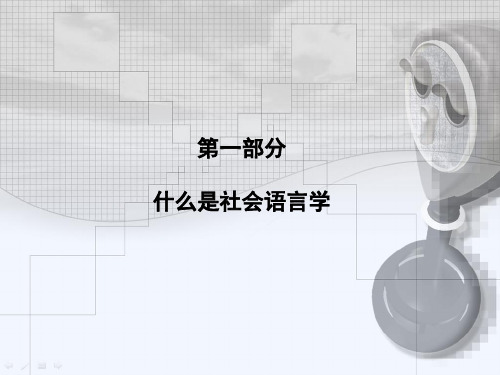
四 在语言学中的 地位
理论意义
实践价值
理论意义
1
拓宽了语言的研究领 域,对语言提出了一 种更为细致的同时又 更为有用的概念。 更为有用的概念。 传统语言学研究语言 的内部关系, 的内部关系,社会语 言学的研究从语言的 外部关系着眼, 外部关系着眼,开拓 了新的领域。 了新的领域。
2
提出了语言研究数量 化的概念。 化的概念。 对一定语言现象的调 查数据, 查数据,对正在演进 中的语言变化作出数 量化的概括。 量化的概括。
语言的性别变异是指男 女在使用同一种语言或方言 时表现出来的差别。 时表现出来的差别。 一般体现在语言结构、 一般体现在语言结构、 言语表达风格的变异等方面。 言语表达风格的变异等方面。
一.语言与性别、年龄变异(续) 语言与性别、年龄变异( 1、语言结构的差异反映在语音、词汇、语法等方面。 、语言结构的差异反映在语音、词汇、语法等方面。
第一部分 什么是社会语言学
什 么 是 社 会 语 言 学?
什 么 是 社 会 语 言 学 ?
二. 研究对象 1 2 3 4 5 6 7
社会因素对语言结构的影响,如行业、阶层、 社会因素对语言结构的影响,如行业、阶层、环境 社会因素对语言功能、 社会因素对语言功能、语言地位的制约作用 与语言使用有关的问题,如语言政策、语言规划、 与语言使用有关的问题,如语言政策、语言规划、双语现象 由社会因素引起的语言关系,如语言接触、语言影响、 由社会因素引起的语言关系,如语言接触、语言影响、语言融合 个人因素对语言的影响,如年龄、性别、 个人因素对语言的影响,如年龄、性别、性格 从语言变异看社会变异 语言因素对社会因素的影响
什 么 是 社 会 语 言 学 ?
六. 主要研究成果
社会语言学 sociolinguistique

(3)社会对语言的影响:
这里讲的社会是广义的社会,可以分为三个部分,第一个是自然环境,这一部分对于语言的影响很明显,它深刻影响语言的构成(比如爱斯基摩人由于生活环境跟雪密不可分,因此用于描述雪的词汇的数量就很大;丹麦瑞典荷兰这些国家由于经常使用驯鹿,因此这些语言里就有丰富的关于鹿的词汇;阿拉伯人由于生活在沙漠中,骆驼与他们的生活息息相关,因此就有很多骆驼的词汇;中国以及很多亚洲国家习惯以米饭为主食,因此在这些国家的语言里,关于米饭的词汇就要比欧洲国家丰富)。
)
社会方言和地区方言相互之间的关系:社会上层它的地区方言的差别就比较小,社会下层它的地区方言的差别就比较大。这一点其实很好理解,因为社会上层普遍知识文化水平较高,其方言的标准化程度就越高;而越到底层,其口语化或地方色彩就越浓。
区分语言与方言
传统语言学把语言看成是具有划一的语音、语法、词汇规则的符号系统,而方言则是语言的分支。其实在许多地方,语言与方言之间的界限并非依据语言系统的结构来划分的。
可是世界上的语言现象和使用语言的人干差万别、纷繁以极。如果不抽象出一些特征,不勾划出一个范围来,研究者简直无从下手去对观察到的情况进行描述和分析。本章第一节所讨论的语言变体就是分析语言现象时所采用的基本单位,而对群体的语言使用者进行分析所采用的基本单位就是言语共同体。
社会语言学原理
社会语言学的基本概念
4)持久性(vitality),指具有稳定的操该种语言的言语共同
语言与性别
调查方法
社会语言学与普通语言学的区别和联系
社会语言学与普通语言学最大的区别在于两者的语言观的差异,
在社会语言学之前无论是历史比较语言学,还是结构主义语言学,都更专注于语言内部结构的探索和研究,忽视语言在整个社会中所处的地位,忽视社会因素对于语言的巨大影响)
社会语言学

性质: 性质:社会语言学是一门交叉学科
特征
:1、鲜明的反传统精神 2、深刻的人文关怀倾向 3、兼容并包的学术胸怀 4、多学科交叉的研究特色 5、格物致用的学术交流 6、互补优势明显的边缘学科 7、归纳为主的实证主义方法
• • • • •
布莱特:社会语言学是研究语言变异。 费希曼:两个研究范围 微观和宏观。 海姆斯:三项目标 祝畹瑾:将研究内容分为5个方面 杨永林:社会语言学是研究语言与社会之 间关系的语言学分支
社会语言学
• • • • • •
含义 性质 特征 代表人物及其代表观点 评价 对外语教学的影响
什么是社会语言学? 什么是社会语言学
兴起于上世纪60年代的美国, 兴起于上世纪60年代的美国,是社会学和语言学结 60年代的美国 合的一门新兴的应用型边缘学科。 合的一门新兴的应用型边缘学科。它把语言看做是一 种社会现象, 种社会现象,存在于是会中的各种因素都可能对语言 产生影响,使语言发生变异, 产生影响,使语言发生变异,社会语言学正是力图通 过研究社会现象对语言产生的影响及结果, 过研究社会现象对语言产生的影响及结果,从而更深 入的解释语言的本质。这部分语言跟社会心理学, 入的解释语言的本质。这部分语言跟社会心理学,人 类学,人文主义社会学联系密切。 类学,人文主义社会学联系密切。
• 社会语言学的理论能帮助教师就语言英语教学的内容作出 更为明智的选择。帮助教师解决如何教的问题, 更为明智的选择。帮助教师解决如何教的问题,包括课堂 上以教师为中心和学生为核心, 上以教师为中心和学生为核心,课堂中采用什么教学技巧 进行教学等 • 了解社会语言学的理论为促进外语教学和研究水平的提高 提供一种新的观察视野和分析方法 • 社会语言与外语教学的结合更能调动学生的思维能力、发 社会语言与外语教学的结合更能调动学生的思维能力、 展中的社会关系级任何形式的协作学习,取得更好的学习 展中的社会关系级任何形式的协作学习, 效果 • 同时外语教学的发展也丰富社会语言学的研究,加深人们 同时外语教学的发展也丰富社会语言学的研究, 对人类语言本质的认识,促进课程建设, 对人类语言本质的认识,促进课程建设,重视应用研究
社会语言学

一、第一章绪论1、社会语言学的定义(掌握)2、社会语言学的研究对象和主要内容(重点掌握)3、社会语言学的分类(理解)4、社会语言学和语言学的区别和联系(理解)二、第二章语言变异1、语言变异的定义及与语言变异有关的几个基本概念,包括语言变项、语言变式、语言变体、语言社团(重点掌握)2、性别变异的含义、表现形式、性别变异的原因(重点掌握)3、年龄变异的含义、表现形式、产生的原因、进行中的变化(重点掌握)4、阶层变异的含义、表现(掌握)5、行业变异的含义、行话的定义、行话的分类,秘密语及其构成手段(掌握)6、语域的含义,制约语域的因素(重点掌握)三、第三章社会语言学研究程序及调查方法1、语言调查的目的、类型、程序(理解)2、定性、定量研究的含义和区别(掌握)3、抽样的含义、抽样的要求(掌握)4、随机抽样的含义和类型(重点掌握)5、非随机抽样的含义和类型(掌握)6、调查问卷的设计(重点掌握)四、第四章语言的接触1、语言接触的含义及其产生的结果(重点掌握)2、语言的借用的定义及其表现形式;词汇的借用;(掌握)3字母词的定义、字母词的分类、字母词产生的原因、字母词的使用(重点掌握)4、语码的定义;语码的混合的定义及类型;语码转用含义及类型;语码混用的含义及原因(重点掌握)5、语言转移的类型;语言转移的表现和模式;语言转移的原因(重点掌握)6、双语双方言现象的定义、双语者与双言者的定义;中国境内的双语、双方言的类型(掌握)7、语言态度的定义、组成因素;影响语言态度的因素;语言态度对语言能力、语言行为的影响;语言态度对语言发展变化的影响;语言态度调查的内容(重点掌握)「社会语言学」是运用语言学和社会学等学科的理论和方法,从不同的社会科学的角度去研究语言的社会本质和差异的一门学科。
主要研究言语社区各语言变体、各变体的功能和各变体的使用者及其特点。
社会语言学(sociolinguistics )是在20 世纪60 年代在美国首先兴起的一门边缘性学科。
- 1、下载文档前请自行甄别文档内容的完整性,平台不提供额外的编辑、内容补充、找答案等附加服务。
- 2、"仅部分预览"的文档,不可在线预览部分如存在完整性等问题,可反馈申请退款(可完整预览的文档不适用该条件!)。
- 3、如文档侵犯您的权益,请联系客服反馈,我们会尽快为您处理(人工客服工作时间:9:00-18:30)。
An Analysis of the Features and Causes of Female Language1401 全雪萍1430100137Introduction:The study of gender language has a long history. As early as 1922, Jens Otto Harry Jesperson has specially opened up a chapter of “ The Women” in his book Language, which discusses the language differences between men and women. Since the 1970s, some famous scholars such as Lakoff , Trugill and others advanced the study to systematize the study of gender study.In recent years, the studies of “female language” are increasing in many magazines and books, which draws much attention. Many researchers have almost reached the same conclusion that women have their own language. Crosby and Nyquist got the conclusion from their studies: the so-called female language is not existed since women are born, but this kind of language reflects the people in the society always put the female in this position that is hard to change.In our society, the female language is characterized by a lack of social status. In this paper, I will start from the features of female language, and simply discuss the factors of its formation.I.The features of female languageMany observers believe that men and women are different in language communication. The female language exists in any language as a widespread phenomenon. Men and women have different choices in expressing ideas when they use the same language. For example, abstract nouns have gender differences in grammar, men call women as “ feminine”, while women call men as “masculine”. The education received by women is that they tone should be soft when they talk; do not refute others; be gentle and modest in language communication; avoid arbitrary or offending others; be aware of overconfidence. The features of female language can be summarized from following aspect:the choice of words, the choice of syntactic and pronunciation and intonation.1.The choice of wordsBoth men and women have their partial words, which can be said that a considerable number of words have been given the label of “feminine” or “masculine”. Men don‟t use( scorned, unwilling to use) some peculiar words in female language that is “ feminine” words. At the same time, women also avoid the “ masculine” expressions. Women often express their feelings without control, they like exaggeration when they talk, so they have the following characteristics of choosing words:1)Like using exaggerated adjectives, such as divine, charming, cute, gorgeous, heavenly” andso on. Men sometimes also use these words, but they rarely use these words to express the same meaning in terms of tradition. “ What a divine idea!” obviously comes from a woman‟s mouth.2)Like using some degree adverbs to emphasize, also like choosing some adverbs to strengthenadjectives, such as “ so” “quite” etc. Lakoff( 1972) and Tarone (1979) prove that men like using “very” and “really” while women like using “so”.3)Are good at using some color words, especially some rare color words, such as “ lavender,magenta, aquamarine”.4)Like adding “-ie” or “-y” after some words or appellations to express “intimacy” or “ little”,such as “ auntie, Billy” etc.5)Women pay more attention to the elegant, subtle language, and try to avoid vulgar words.Such as “ shit, damn, hell”, they prefer to say “ oh dear, god, my Heavens” and some other more gentle and implicit words.6)Using euphemism instead of unpleasant meanings or disrespectful expressions.7)Using more expressions marked as courtesy. Such as “ thank you”, “please” etc.2.The choices of syntacticSyntactic of female language doesn‟t have distinctive features like vocabulary of female language, but some features still show the gender differences in language. Women often use the following syntactic structures:1)Tag questionsWe find that women often add tag questions after some statements, in order to show courtesy, politeness and euphemism. They seldom use direct w ays to express their feelings. They don‟t say “ He can‟t do that.” , but say “He can‟t do that, can he?”. For example, nurses often say “ We are going to have our temperature taken, aren‟t we?”2)Ambiguous sentences and subjunctive mood sentencesWomen often use ambiguous sentences for showing respectfulness, politeness to the hearers. For example, the family nanny often use this kind of sentences: we are going to take our snap or go right to sleep.” women pay more attention to avoid direct order s or requests when they talk. For example, they always say “ Would you like to wash the dishes?”when they want their husband to wash the dishes.3)The regulating structureUsing this kind of very kind and polite structure can express tentative requirements or suggestions, also can avoid direct response. Using some words like “ I suppose, I think, I guess” or some uncertain words like “ probably, possibly, sort of, kind of” reflects women‟ s less confidence and less decisiveness than men.4)Standard syntactic formsWomen are more conscious than men in the use of standard syntactic forms. For example, women rarely use nonstandard multiple negatives . Besides, fewer nonstandard words are also found in female language.3.Pronunciation and intonationMen and women have phonetic differences in language, in addition to natural factors of voice forming, many phonetic differences between men and women in language are caused by social factors. It is widely acknowledged that women‟ s pronunciation are more standard, so it‟s more close to “ Received Pronunciation”(RP). Women lead the standards of language changes. Trugill and Fisher …s studies showed that the majority of men (62.2%) pronounce the “ing” to “in”, while only 28% women pronounce to “in” women have more opportunities to pronounce the lateral “ ɪŋ” than men. ( Trugill, 1983: 86)And women have more intonation changes than men, so women are more expressive. Generally speaking, women often use rising intonation in conversation in statement sentences to express in order to show their respect and create a relaxing atmosphere, not as decisive and affirmative as men using falling intonation. Because women do not have much assurance to show their decisive and affirmative attitude than men. For example:Husband: when will dinner be ready?Wife: Oh..., around six o‟ clock ?Although the wife can affirm that when dinner will be ready, she still use rising intonation to answer her husband in order to show her uncertainty and timidity.II.Factors contributing to the development of female language changes1.Physical and psychological factorsWomen‟ s physiological characteristics determine some features of female language, such as the high peach of tone, and they can master the correct language forms easily. Female unstable social status makes them very sensitive to the standard language which can reflect people‟s identity and status. In order to obtain the same power and status of men, women have been trying their best to use superior or standard language all the time in order to establish their own gender pronouns. This is why women‟ s language style and accent are closer to the standard and more elegant than men. Women tend to accept the idioms and jargons of so-called upper class for improving their social status. Women are the pioneers who brought standard language to their communities, and their language is bound to affect their offspring. Female language usually is more tactful, hesitant and ambiguous. On one side, it shows women‟ s lack of confidence; on the other side, it symbolizes the features of female language in female politeness theory.2.Social factorsThe language differences between men and women are also caused by many social factors such as cultural differences, social status and roles, they also reflect the different interests and different reactions to others of men and women. In almost every language society, men are always in the powerful and dominant position, while women are obedient and subordinate, thus female language also companies with consulting and obedience. Because women‟ s status and power on society are relatively inferior to men, they need to be timid, gentle, subtle and uncertain and like using rising intonation and avoiding problems. And the society specifies higher standards f or women‟ s words and deeds, so women often use mild and correct language style to communicate with others as possibly as they can in order not to offend others and to be discriminated. The duty of bearing and parenting children also makes them try to use polite and standard language. Besides, women pay more attention on the elegance of language than men, they prefer some pleasant words to get others‟ acknowledgment , even when they express their dissatisfaction. And women …s pronunciation is more correct and standard, it proves that men enjoy higher power in language using than women, women have to be obey the conventional standards.III.ConclusionThe gender differences of language is the result of different social division of labor and different position in social political and economic life of men and women, language will also change instantly if social attitudes towards men and women have some change. With the promoting of women‟ s power and status, the gender differences of language will also have different reflections. Now more and more women come to society, social work makes women become more confident when they talk, they still prefer gentle and tactful language, but they add more strength and flexibility to their language and the skills of female language also have been widely promoted. With the improvement of social civilization, the gender differences of language will be gradually reduced, even there will be no obvious differences in the future.References:Judith Orasanu et al. ( edt ). Language, Sex and Gender: Does La Difference Make a Difference? [M]. New York: The New York Academy of Science, 1979.Lakoff, R. Language and Women‟ s Place [M]. Harpers &Row Publishers, 1975.Trugill, D. Sociolinguistics: An Introduction [M]. Penguin Books, 1974.程欣,从女性语言特点看英语中性别歧视现象[M]. 郑州航空工业管理学院学报(社会科学版), 2011(30): 164-167.李红艳,论英语中女性语言的特点和对女性的语言性别歧视现象[M]. 中山大学研究生学刊(社会科学版), 2005(26): 122-128.于崇洛,张广保,美语中的女性语言[J]. 临沂师范学院学报, 2001(2):133-135.张爱玲,论女性语言的特点及其文化内涵[J]. 外语界, 1995(1):73-79.张从江,论英语中女性语言的特点[J]. 齐齐哈尔大学学报, 2002(7): 79-80.。
